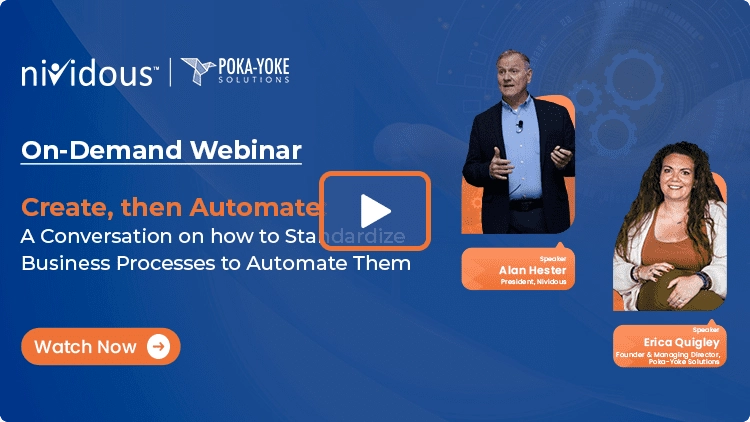Intelligent Automation in Human Resources
Transform HR departments into strategic powerhouses with HR automation solutions. Enhance efficiency, reduce errors, and focus on driving organizational success.
HR Automation Success Stories
Saved annually
Reduction in operational cost
Accelerated process completion time
A High-tech Manufacturer Automates its Back-office Operations with Nividous Bots
The Nividous platform automated over 20 key processes in administration, HR, accounting, and purchasing. The platform streamlined operations, improved efficiency, and quicker delivery, highlighting its transformative impact on business success.
Intelligent Automation Use Cases in Human Resources
HR departments are essential for managing every stage of an employee’s journey, from onboarding to exit. However, the volume and complexity of HR tasks can often hinder timely resolution. HR automation streamlines processes like leave requests, employee records, and compliance reporting, ensuring efficient management by sophisticated systems.
- Employment History Verification
- Employee Onboarding
- Payroll Management
- Leave and Attendance Management
- Performance Management
- Expense Claims and Reimbursements
- Talent & Training Management
- Employee Records Management
- Employee Engagement and Surveys
- Employee Self-Service Portals
- Employee MIS/Reporting
- Exit Management
- Final Settlements & Documentation
- Employee Helpdesk
- Tax Management

Redefining HR Excellence with Intelligent Automation
Businesses worldwide are evolving and adopting automation to streamline their processes. For HR teams, automation is particularly beneficial as it allows them to focus on higher-level tasks that advance their human resources strategy.
In recent years, HR departments have faced a variety of challenges, including economic uncertainty, rapid technological advancements, increasing diversity and inclusion, remote work and hybrid work models. To address these challenges, integrating automation into HR processes becomes crucial for enhancing efficiency and managing workloads more effectively. Adopting intelligent automation for HR is a significant step toward modernization.
HR Automation Benefits
Wage calculations, data management, and maintaining positive employee experiences become increasingly challenging for HR teams as they manage a global workforce. Traditional methods struggle to keep pace with expanding businesses.By automating routine tasks like global payments and access provisioning, HR automation empowers teams to prioritize strategic workforce management.
Data-driven Insights
Provides real-time data for performance management, identifying patterns and areas for improvement, leading to better decision-making.
Transparency and Consistency
Intelligent automation for HR processes ensures uniform practices and improves accountability across multiple locations.
Self Service Portals
Employee self service portals enhance employee satisfaction by simplifying benefits, expense reporting, and leave applications, leading to higher retention.
Increased Productivity
Intelligent automation frees up HR staff to focus on strategic tasks and allows employees to spend less time on tactical processes.
Assured Compliance
Automated HR processes enable enhanced compliance with employment laws and tax rules globally. Efficiently create contracts, manage benefits, and organize records.
Scalability
With HR automation, businesses can easily adapt to growing market needs and larger employee bases.
Harness the Power of the Nividous Platform for HR Automation
The Nividous platform natively combines the power of advanced automation technologies, namely RPA, AI, Generative AI, and Low-Code Process Automation, offering a comprehensive solution for end-to-end HR process automation.
Additional Resources

Webinar
Create, then Automate: A Conversation on how to Standardize Business Processes to Automate Them
Business Process Automation (BPA) can be daunting for organizations embarking on their digital transformation journey. Despite the challenges, BPA offers significant benefits, including cost savings, process efficiency, and empowering employees to focus on value-driven tasks. Watch experts discuss how to start and succeed with BPA. Gain valuable insights that you can apply to your own organization.
BLOG
How Do Businesses Use Automation To Help With Their Daily Tasks?
Explore how automation enhances efficiency in everyday tasks. Our survey of business owners reveals their successful approaches.
BLOG
Reducing Human Error In The Workplace: The Role Of Intelligent Automation
Discover how intelligent automation can significantly lower the rates of manual errors.
BLOG
7 Proven Ways To Increase Work Efficiency With Automation
Are you curious about boosting work efficiency with intelligent automation? Check out industry-specific use cases.
HR Automation FAQs
What is HR Automation?
Human resources automation (HR automation) utilizes software to streamline and automate repetitive HR tasks. This approach enables HR departments to save time and enhance personnel management. With increased efficiency, HR teams can focus on more strategic activities, such as planning, strategizing, engaging employees, and making informed decisions, ultimately boosting productivity and adding greater value.
How to Automate HR Processes?
To automate HR processes, follow these steps:
- Identify Key Tasks for Automation – Focus on repetitive tasks that are rules-based, voluminous, and labor-intensive. Recruitment, onboarding, and payroll are prime candidates for automation due to their significant human involvement.
- Optimize Existing Process – Define step-by-step workflows to streamline your existing processes before automating.
- Identify Suitable Technology and Vendor – Engage with multiple vendors to understand their offerings and evaluate them against your technology and business needs. Ensure tools are easy to deploy and compatible with your existing HR systems.
- Perform a Proof of Concept (POC) – Run a POC to assess the tool’s effectiveness and determine expected ROI before investing heavily.
- Deploy, Test, and Refine -Make adjustments based on initial results and proceed with final deployment.
- Train Your Team – Educate your HR staff on the new tools.
- Monitor and Optimize – Continuously review and improve the automation.
What are some common use cases for HR automation?
By minimizing manual tasks, HR automation delivers a seamless digital experience. Common use cases for HR automation include:
- Recruitment: Job postings and applicant tracking.
- Onboarding: New hire paperwork and training.
- Payroll: Salary calculations and benefits management.
- Performance Management: Reviews and feedback.
- Leave Management: Requests and tracking.
- Employee Records: Updates and storage.
- Compliance: Adherence to laws and policies.
- Training: Scheduling and progress tracking.
How does HR automation improve employee experience?
HR automation improves employee experience by:
- Simplifying routine tasks: Streamlines onboarding, leave requests, and other common HR processes.
- Reducing errors: Minimizes errors in payroll and data management.
- Providing easy access: Offers self-service portals for convenient access to HR services.
- Improving communication: Ensures timely updates and reduces communication gaps.
- Enhancing HR focus: Allows HR staff to focus on strategic initiatives and employee engagement.
How does the Nividous platform support HR automation?
The Nividous platform combines RPA, AI, and LPA to orchestrate and automate complex HR processes end-to-end. Nividous IA Bots handle your key HR systems, streamlining workflows and ensuring a smooth and efficient HR experience. Discover more about the Nividous platform here.
Start Your HR Automation Journey with Nividous
Guaranteed Production Roll-out of a Trained Nividous IA Bot in 3-4 Weeks.